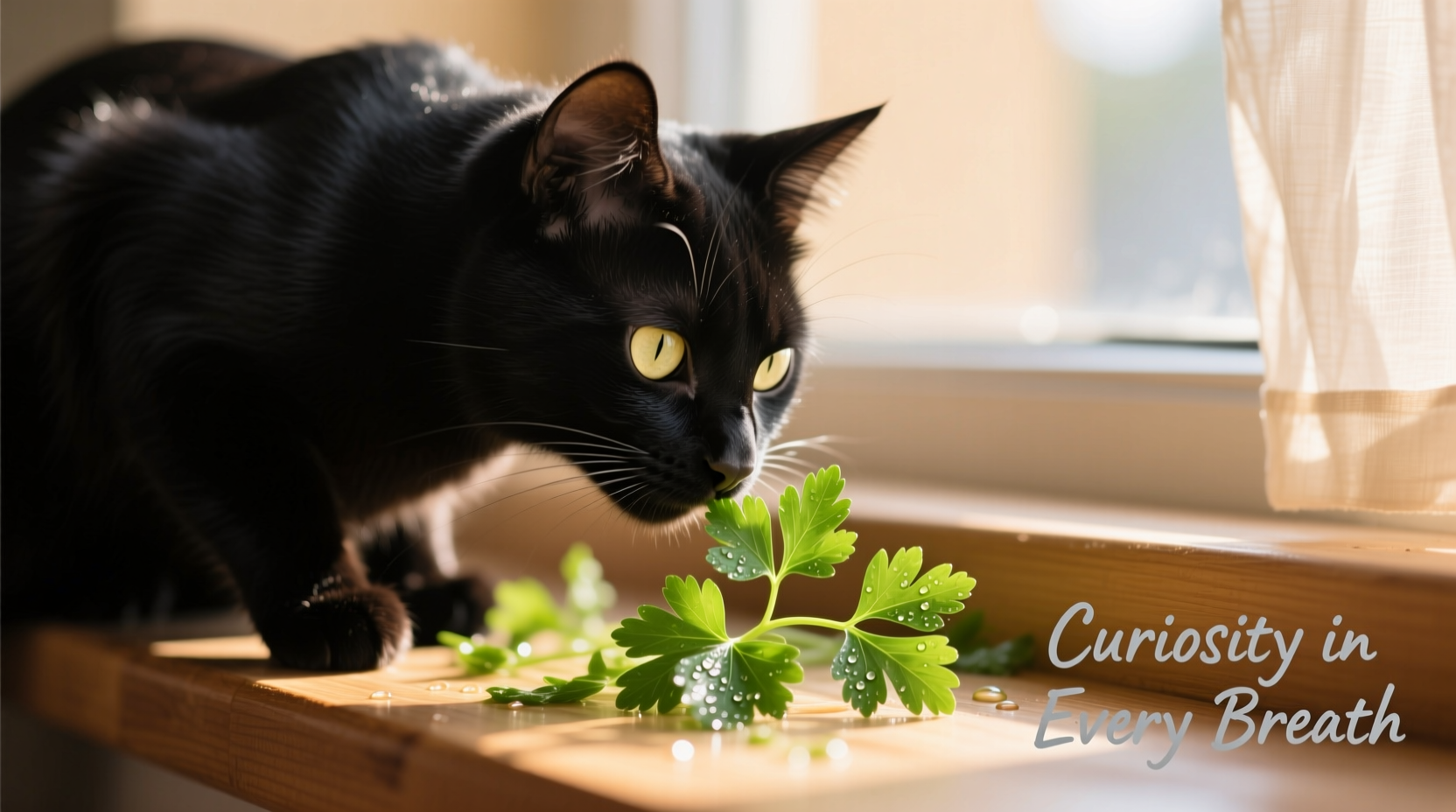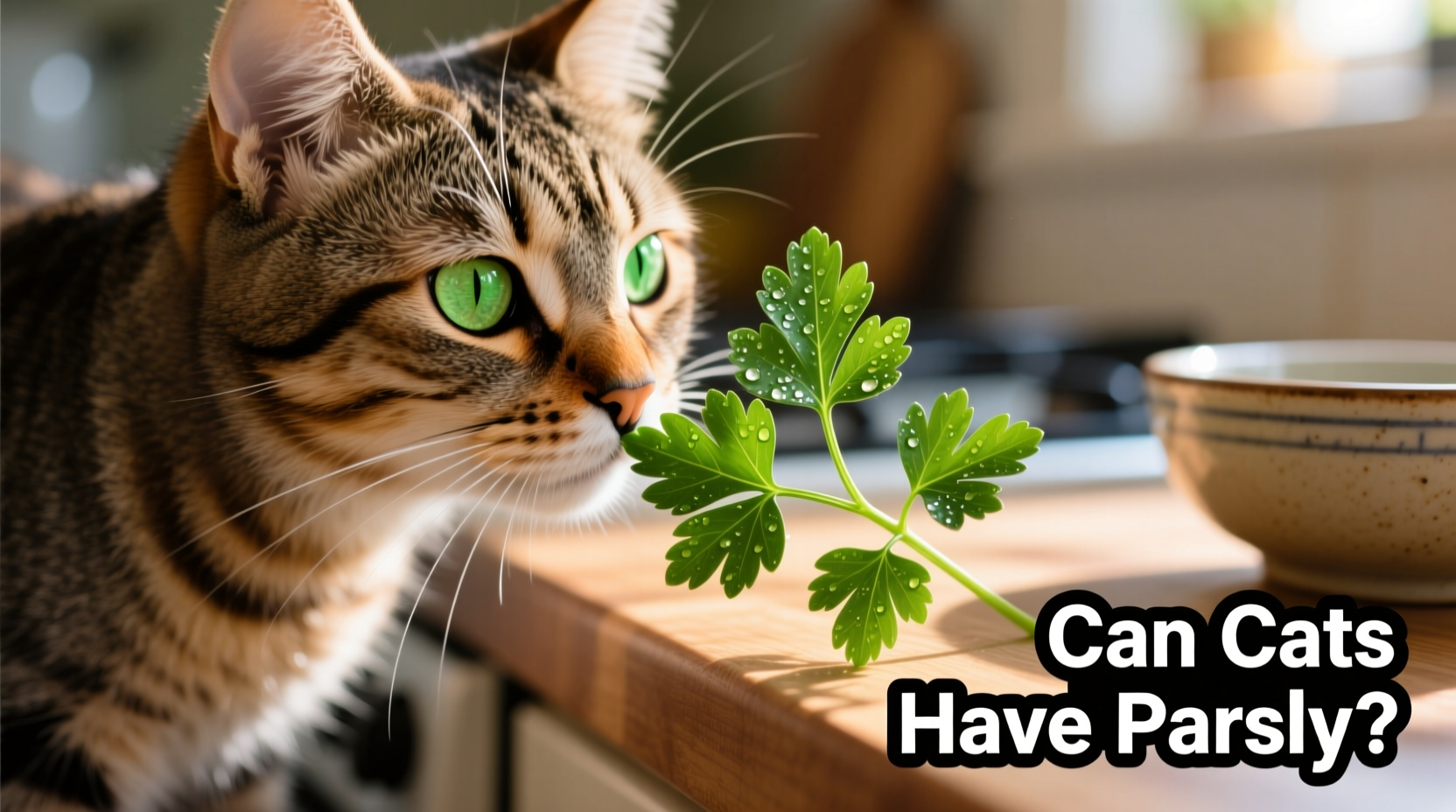Yes, cats can safely consume small amounts of fresh parsley as an occasional treat. This herb provides vitamins A, C, and K plus antioxidants that may benefit feline health when given in moderation. However, excessive consumption can cause digestive upset due to its oxalate content. Always consult your veterinarian before introducing new foods to your cat's diet, especially if they have kidney issues or are on medication.
As a cat owner, you've probably wondered which human foods are safe to share with your feline companion. When you're preparing meals and notice your cat showing interest in the fresh herbs on your counter, it's natural to question: can cats have parsley? Understanding which kitchen staples are safe for cats is crucial for responsible pet care.
While cats are obligate carnivores requiring meat-based diets, certain herbs like parsley can provide supplemental benefits when offered appropriately. This comprehensive guide examines the science behind feeding parsley to cats, including safety considerations, nutritional value, and practical serving recommendations from veterinary nutrition perspectives.
Understanding Parsley's Nutritional Profile for Felines
Parsley (Petroselinum crispum) contains several nutrients that may benefit cats in small quantities:
- Vitamin A for vision and immune function
- Vitamin C as an antioxidant
- Vitamin K for blood clotting
- Chlorophyll which may freshen breath
- Trace minerals including iron and calcium
Unlike humans, cats produce their own vitamin C, so this particular nutrient offers less benefit. The primary advantage comes from parsley's chlorophyll content and mild digestive properties. Many commercial cat foods actually include small amounts of parsley as a natural breath freshener and digestive aid.
Scientific Safety Assessment: Benefits vs. Risks
According to the ASPCA Animal Poison Control Center, parsley is considered non-toxic to cats when consumed in reasonable amounts. However, like many plants, it contains compounds that require moderation.
| Beneficial Components | Potential Concerns |
|---|---|
| Chlorophyll (natural breath freshener) | Apiol (in large quantities may cause digestive upset) |
| Vitamin K (supports blood health) | Oxalates (may contribute to kidney stones in predisposed cats) |
| Fiber (aids digestion in small amounts) | Essential oils (may irritate sensitive digestive systems) |
| Antioxidants (fight free radicals) | Pesticide residue (if not organically grown) |
The Veterinary Information Network notes that while parsley is generally safe, cats with pre-existing kidney conditions should avoid it due to the oxalate content. Similarly, cats on blood-thinning medications should consume parsley only under veterinary supervision because of its vitamin K content.
Appropriate Serving Guidelines for Cat Owners
When offering parsley to your cat, follow these evidence-based recommendations:
- Portion size: No more than 1-2 small sprigs (approximately 1/2 teaspoon chopped) for an average-sized cat
- Frequency: Maximum of 1-2 times per week as an occasional treat
- Preparation: Fresh, thoroughly washed parsley is preferable to dried varieties
- Introduction: Start with tiny amounts to monitor for any adverse reactions
Consider these contextual boundaries when deciding whether to feed parsley to your cat:
- Kittens under 6 months should avoid parsley as their digestive systems are still developing
- Cats with kidney disease or urinary tract issues should not consume parsley
- Pregnant or nursing cats should avoid parsley due to potential uterine stimulation effects
- Cats on anticoagulant medications require veterinary approval before consuming parsley
Safe Preparation Methods for Cat-Safe Parsley
How you prepare parsley significantly impacts its safety and palatability for cats:
- Washing thoroughly: Remove all pesticide residues by soaking in water with a small amount of vinegar
- Chopping finely: Small pieces are easier for cats to digest than whole sprigs
- Steeping for sensitive cats: Create a mild parsley tea by steeping in warm water, then cooling before offering
- Mixing with food: Blend small amounts with wet food to mask the flavor for picky eaters
Many cat owners report success by growing cat-safe parsley in a small pot specifically for their pets. This ensures the herb is free from harmful chemicals and provides an enriching activity for cats who enjoy nibbling on greens.

Recognizing Adverse Reactions to Parsley
While rare, some cats may experience negative reactions to parsley. Monitor your cat for these symptoms after introducing parsley:
- Excessive vomiting or diarrhea within 12 hours of consumption
- Loss of appetite lasting more than 24 hours
- Unusual lethargy or weakness
- Increased urination or signs of urinary discomfort
- Excessive drooling or pawing at the mouth
If you notice any of these symptoms, discontinue parsley immediately and contact your veterinarian. Most adverse reactions are mild and resolve within 24-48 hours after removing the parsley from the diet.
Alternative Cat-Safe Herbs to Consider
If your cat doesn't take to parsley or you're looking for variety, these herbs are generally considered safe alternatives:
- Catnip (Nepeta cataria): Safe and enjoyable for most cats, though not all respond to it
- Valerian root: Similar effects to catnip for many felines
- Wheatgrass: Often sold as "cat grass" and provides fiber benefits
- Mint (in small amounts): Peppermint or catmint varieties are generally safe
Remember that even safe herbs should constitute no more than 1-2% of your cat's total daily food intake. The foundation of your cat's diet should remain high-quality commercial cat food formulated to meet their specific nutritional needs.
When to Consult Your Veterinarian About Dietary Changes
Before introducing parsley or any new food to your cat's diet, consider scheduling a consultation with your veterinarian, especially if:
- Your cat has pre-existing health conditions
- You're considering making significant dietary changes
- Your cat is on medication that might interact with herbal supplements
- You've noticed unexplained digestive issues
Veterinary nutritionists emphasize that while occasional parsley treats are generally safe, they should never replace balanced commercial cat food. Your veterinarian can help determine appropriate portion sizes based on your cat's individual health profile and nutritional requirements.











 浙公网安备
33010002000092号
浙公网安备
33010002000092号 浙B2-20120091-4
浙B2-20120091-4